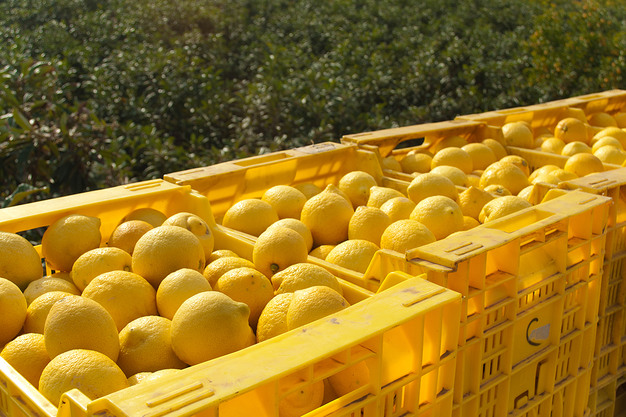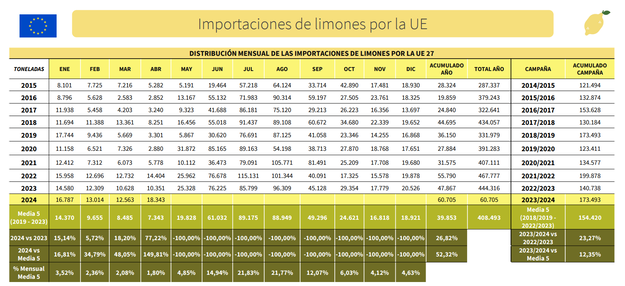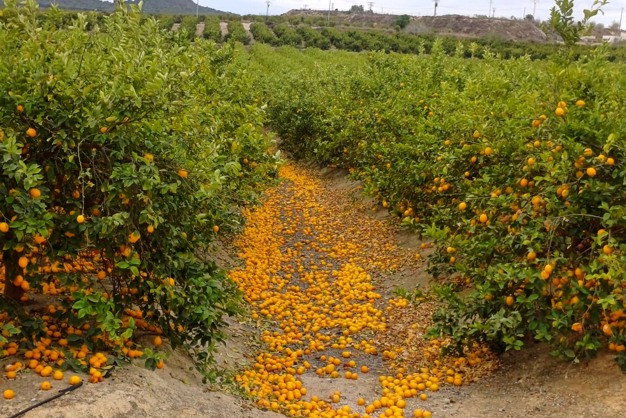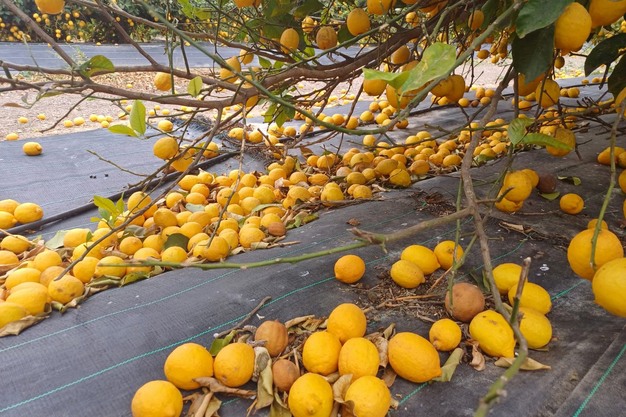AILIMPO's lemon harvest forecast for the 2023/2024 season, made last September, anticipated a 34% increase in the production compared to the 2022/2023 campaign (when it fell to the lowest point in the last 10 years), with a 30% increase for Fino lemons and a 45% increase for the Verna.

However, despite this announcement, lemon imports from third countries into the EU-27 have reached 173,493 tons so far this season (September 2023-April 2024), which entails an increase of 23.3% (+32,750 tons) compared to the previous campaign, and of 12.4% (+19,100 tons) compared to the average for the period.
Looking at the data from 2024, between January and April (fully overlapping with the Spanish campaign), these percentages are even higher. With 60,705 tons of imported lemons, acquisitions of non-EU lemons have been 26.8% higher (+12,840 tons) than last year, and 52.3% (+20,850 tons) higher than the average of the last 5 years.
But, focusing on what happened in April, the data published in the Enhanced Monitoring Bulletin on Citrus Imports in the EU, shared monthly by MAPA, reveal that while thousands of tons of lemons were abandoned with no commercial outlet in the fields of Alicante, Murcia, or Malaga, with prices at origin on week 11 falling below 10 cents per kilo on average in the Region of Valencia, acquisitions of lemons from third countries, with Turkey at the forefront, recorded an increase of 77.22% compared to April 2023, and of 150% compared to the average of the last 5 years.

Source MAPA. Click here for a larger image.
"Different conclusions can be drawn from this data, but the most important is that they completely debunk the theory that Spain has an excess of lemons," says José Vicente Andreu, lemon producer and president of ASAJA Alicante. "The interprofessional itself is persuading us to believe that there is an overproduction of lemons in Spain due to an excess of hectares planted, and that there is not enough place in the market for all the lemons being produced, so we must uproot the fields."
"This would make sense if lemon imports from third countries were not increasing, but as we can see, they continue to grow, and countries like Turkey or South Africa are planting as much or even more lemons than Spain, so if we reduce our production, they will continue to take an increasingly larger market share."

"It is unacceptable for imports to have increased after 400,000 tons of perfectly good lemons that fully complied with all phytosanitary regulations were left in the fields. Especially since the lemons from Turkey were of dubious quality and it wasn't clear whether they met the EU's legislative requirements, as demonstrated by the many detections reported monthly by the RASFF."
"Regarding this year's overproduction, there was a larger harvest because the weather conditions in the spring of 2023 were extremely favorable for the fruit setting; therefore, before requesting a decrease in the Spanish production, which would only worsen the crisis in the citrus growing sector, a regulation of imports should be requested to prevent the entry of lemons that do not comply with EU legislation, and give preference to the European production in crisis situations like this year's. In fact, if another 80,000 tons of lemons had been sold, which is half of the volume imported from third countries this campaign, we wouldn't be in the current situation."
"It's important to be aware of the fact that Spanish lemon exports have remained stable and that if we have become leaders with our lemons it is because we have been doing things really well. We should not backtrack, but continue moving forward, while also staying vigilant, especially of Turkey and Egypt, two countries that compete directly with us, but with infinitely lower costs and with completely different legislation."

"Supermarkets are free to buy their products from any source, but we won't stop demanding that all products entering the EU must comply with the same phytosanitary and sustainability standards that are required of us by the European Parliament. We cannot allow any double standards, because European producers will otherwise be driven to ruin by that lack of homogeneity. And after losing our self-sufficiency in food production and depending on other countries, we will also lose our freedom."
For more information:
José Vicente
ASAJA Alicante
Tel.: 619 31 74 15
Email: [email protected]
